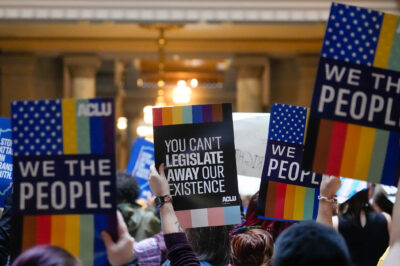No Bond, No Bars: Federal Court Rejects the Prolonged Detention of Immigrants Without a Hearing
On Monday, a federal appeals court ruled that the government cannot lock up immigration detainees for prolonged periods of time without providing them a basic form of due process — a bond hearing where the government must show that their detention is justified.
The ACLU, ACLU of Southern California, and Stanford Law School Immigrants’ Rights Clinic brought the case on behalf of Amadou Lamine Diouf, a man held in detention for nearly two years while fighting his immigration case even though he posed no danger or flight risk. During this time, Diouf never received his day in court, but only an administrative custody review that rubber-stamped his continued imprisonment. In a unanimous decision, the 9th Circuit Court of Appeals held that a person who has been subjected to prolonged immigration detention is entitled to release unless the government can show that he poses a risk of flight or a danger to the community at a bond hearing before an immigration judge.
Diouf’s story makes clear why detention must be limited by these basic procedures. He first came to the United States from Senegal when he was 21 years old to study information systems at California State University. After he graduated, he overstayed his student visa and married a U.S. citizen. Although he was eligible for a green card based on his marriage, the government detained him after his former immigration attorney failed to file important legal papers.
Diouf was incarcerated for nearly two years before an immigration judge held that he was not a flight risk and ordered his immediate release. His marriage subsequently failed in large part because of the stress of his detention.
Without a bond hearing, Diouf would still be sitting in detention today. And unfortunately, his case represents a much larger problem. The government’s increasing use of detention as an immigration enforcement strategy means that, on any given day, thousands of immigrants, including green card holders and asylum seekers, are detained for prolonged periods of time without a hearing.
The detention of people who pose no danger or flight risk not only violates the law, but is bad policy. The government currently spends millions locking up people whose detention serves no purpose, squandering taxpayer dollars in a time of fiscal austerity. Prolonged immigration detention is also cruel and unfair. Individuals are routinely held in far-flung detention centers that are hundreds of miles away from their attorneys and family members. Their detention for months or years makes it nearly impossible for them to fight their case — even when they have legitimate claims for legal status in the United States.
But ultimately, as the court recognized, Diouf’s case is about our fundamental values. The United States is not a country that arrests people and then detains them without a hearing for months or years. Rather, the Constitution guarantees every person — regardless of immigration status — a day in court. The Obama administration should use Monday’s court decision as an opportunity to revisit its national immigration detention policy and bring it into compliance with current law and the Constitution.
Learn more about immigrants rights: Subscribe to our newsletter, follow us on Twitter, and like us on Facebook.



